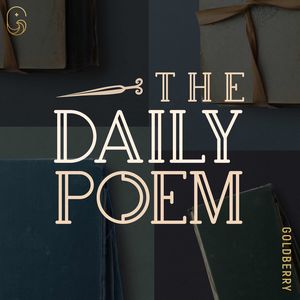
 Ted Kooser's "Christmas Mail"
Ted Kooser's "Christmas Mail"Today’s poem is for all of the mail carriers. Happy reading. This is a public episode. If you'd like to discuss this with other subscribers or get access to bonus episodes, visit dailypoempod.substack.com/subscribe
 John Robert Lee's "XIX: I often wonder whether the prodigal son"
John Robert Lee's "XIX: I often wonder whether the prodigal son"Today’s poem–from Lee’s new book, After Poems, Psalms–offers memory and the psalter as parallel texts for Lectio Divina. Happy reading. Lee’s book is backordered at US outlets like Bookshop.org, but is in stock at Barnes & Noble and can be acquired directly from Peepal Tree Press (or in digital format from the behemoth-that-shall-not-be-named). This is a public episode. If you'd like to discuss this with other subscribers or get access to bonus episodes, visit dailypoempod.substack.com/subscribe
 Robert Frost's "Dust of Snow"
Robert Frost's "Dust of Snow"Robert Frost is having one of those days. Happy reading. This is a public episode. If you'd like to discuss this with other subscribers or get access to bonus episodes, visit dailypoempod.substack.com/subscribe
 Mary Mapes Dodge's "A Song for St. Nicholas"
Mary Mapes Dodge's "A Song for St. Nicholas"Today’s poem is an appeal to the jolly giver of gifts. Happy reading!For more St. Nick poems, head over to the St. Nicholas Center. This is a public episode. If you'd like to discuss this with other subscribers or get access to bonus episodes, visit dailypoempod.substack.com/subscribe
 Luci Shaw's "Holding On"
Luci Shaw's "Holding On"Today’s poem is a tribute to the kind and lovely Luci Shaw, who died earlier this week. The poem–a contemplation of mortality–is a representative sample of her contemplative verse, and takes on new meaning after her passing. Happy reading. This is a public episode. If you'd like to discuss this with other subscribers or get access to bonus episodes, visit dailypoempod.substack.com/subscribe
 John Keats' "In drear nighted December"
John Keats' "In drear nighted December"Today’s poem speaks of speaking the unspeakable, and feeling the un-feelable. Happy reading. This is a public episode. If you'd like to discuss this with other subscribers or get access to bonus episodes, visit dailypoempod.substack.com/subscribe
 Jane Kenyon's "Let Evening Come"
Jane Kenyon's "Let Evening Come"Whether your burgeoning inter-holiday malaise needs pruning or a little low-key encouragement, today’s poem (on a Monday, no less!) might be just the thing. Happy reading. This is a public episode. If you'd like to discuss this with other subscribers or get access to bonus episodes, visit dailypoempod.substack.com/subscribe
 Dorianne Laux's "A Short History of the Apple"
Dorianne Laux's "A Short History of the Apple"Today’s poem goes out as a palate-cleanser for everyone who may have lost their relish for eating after the Thanksgiving holiday. Happy reading. This is a public episode. If you'd like to discuss this with other subscribers or get access to bonus episodes, visit dailypoempod.substack.com/subscribe
 Ben Jonson's "Inviting a Friend to Supper"
Ben Jonson's "Inviting a Friend to Supper"Today’s poem is just the thing if you need to make any last-minute invitations to Thanksgiving dinner. Happy reading! This is a public episode. If you'd like to discuss this with other subscribers or get access to bonus episodes, visit dailypoempod.substack.com/subscribe
 William Matthews' "Onions"
William Matthews' "Onions"Today’s poem is the perfect prelude to Thanksgiving–not only by whetting the appetite, but by uncovering the hidden glories of one of the most enduring and ubiquitous of nature’s gifts. Happy reading. This is a public episode. If you'd like to discuss this with other subscribers or get access to bonus episodes, visit dailypoempod.substack.com/subscribe
 George Herbert's "Anagram"
George Herbert's "Anagram"Today’s poem, though brief, is arguably “bigger on the inside,” just like its subject. Happy reading. This is a public episode. If you'd like to discuss this with other subscribers or get access to bonus episodes, visit dailypoempod.substack.com/subscribe
 Archibald MacLeish's "Ars Poetica"
Archibald MacLeish's "Ars Poetica"It’s one thing to write a poem claiming poetry should show rather than tell; it is another thing entirely for that poem to follow its own advice. Happy reading. This is a public episode. If you'd like to discuss this with other subscribers or get access to bonus episodes, visit dailypoempod.substack.com/subscribe
 Robert Burns' "Epistle to a Young Friend"
Robert Burns' "Epistle to a Young Friend"In today’s poem (sometimes printed alternatively as “Letter to a Young Friend”), Scotland’s national poet gives life advice with his characteristic blend of sincerity and levity. Happy reading! This is a public episode. If you'd like to discuss this with other subscribers or get access to bonus episodes, visit dailypoempod.substack.com/subscribe
 Emily Dickinson's "I dwell in Possibility"
Emily Dickinson's "I dwell in Possibility"Today’s poem is a little more (purposefully) enigmatic than most of Dickinson’s verse. Happy reading. This is a public episode. If you'd like to discuss this with other subscribers or get access to bonus episodes, visit dailypoempod.substack.com/subscribe
 Robert Hass' "After the Gentle Poet Kobayashi Issa"
Robert Hass' "After the Gentle Poet Kobayashi Issa"Today’s poem may be triggering for anyone who has had to endure a vacation they didn’t plan or really even want to go. Happy reading. This is a public episode. If you'd like to discuss this with other subscribers or get access to bonus episodes, visit dailypoempod.substack.com/subscribe
 0
0 0
0